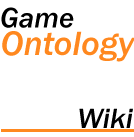

| Home | Talks and Slides | My GameLog | Research and Projects | Publications | Resume | Teaching |
Research Interests and Related ProjectsI am a professor in the Entertainment Arts & Engineering Program at the University of Utah. | ||||||
Ethical GamesEthicalgames.org is a (forthcoming) website dedicated to examining and discussing videogames that are ethically notable. An ethically notable game is loosely defined as a game that provides opportunities for encouraging ethical reasoning and reflection. In other words, it is a game that may encourage people think about what it means to be a better person, what it means to do the "right thing", and how we can become better people. Some games might do this through their story or characters while others may do it through their gameplay.
|
||||||

(Website) |
GameLogGameLog is an online blogging environment for supporting reflection of gameplaying experiences. By writing about the games they play, users can begin to identify gameplay features and design elements present in multiple games, and how these features interact to provide particular experiences. GameLog also support users' understanding of how a game, and the gameplay experience, can change over time. GameLog differs from traditional blogging environments because each user maintains multiple parallel blogs, with each blog devoted to a single game. When a user starts playing a new game, he simply starts a GameLog for that game and can then write his thoughts and feelings about it. When done playing, for whatever reason, he can "close" the GameLog. All GameLogs, closed or open, are always available for reading. Users can also comment on each other's entries. GameLog is a public site and you are invited to register and use it. It has also been used in a few university courses as part of the regular curriculum.
|
|||||

(Website) |
Game Ontology Project (and Wiki)The Game Ontology Project (GOP) is a framework for describing, analyzing and studying games. It is a hierarchy of concepts abstracted from an analysis of many specific games. GOP borrows concepts and methods from prototype theory as well as grounded theory to achieve a framework that is always growing and changing as new games are analyzed or particular research questions are explored. The Game Ontology currently resides, in its entirety, on a wiki. It is available for perusal, comment, and participation. Any and all contributions are welcome. You don't even need to sign up!
|
|||||
Older or Currently Dormant ProjectsIf you're interested in working on anything related to these, send me an email. | ||||||

(Website coming soon) |
TowerDefense Generator(with Pitchatarn Lertudomtana)Tower Defense games are a subgenre of real-time strategy games in which the goal is to stop enemies reaching a certain area of a map by placing static units (towers) that attack and hopefully destroy them. In this project we are defining a vocabulary and analytic framework for describing and analyzing these kinds of games. We are also currently prototyping a tool that can be used by a game designer to create tower defense games (and/or levels) by “tweaking” or managing the features we've identified. |
|||||
(Website) |
Gamescapes Symposium(event)In September 2006 I organized and hosted a 2-day symposium that explored the medium of the videogame together with the relationship that interactive new media can have with learning and education. The event featured talks and demos of research happening at Georgia Tech. |
|||||
 |
Anival(inactive project)Anival (short for "Animation Festival") project explored the design and development of an online community to support the collaborative creation of short animated films. In particular, we looked at non-software factors that contribute towards successful use of a multimedia authoring tool by non-expert children. We studied the use of Alice, a 3D authoring tool developed by some cool folk up at Carnegie Mellon University in the context of middle-school language arts classes. Our work focused on the social context the kids worked in as well as how this could be extended to an online environment such as a web-based community.
|
|||||